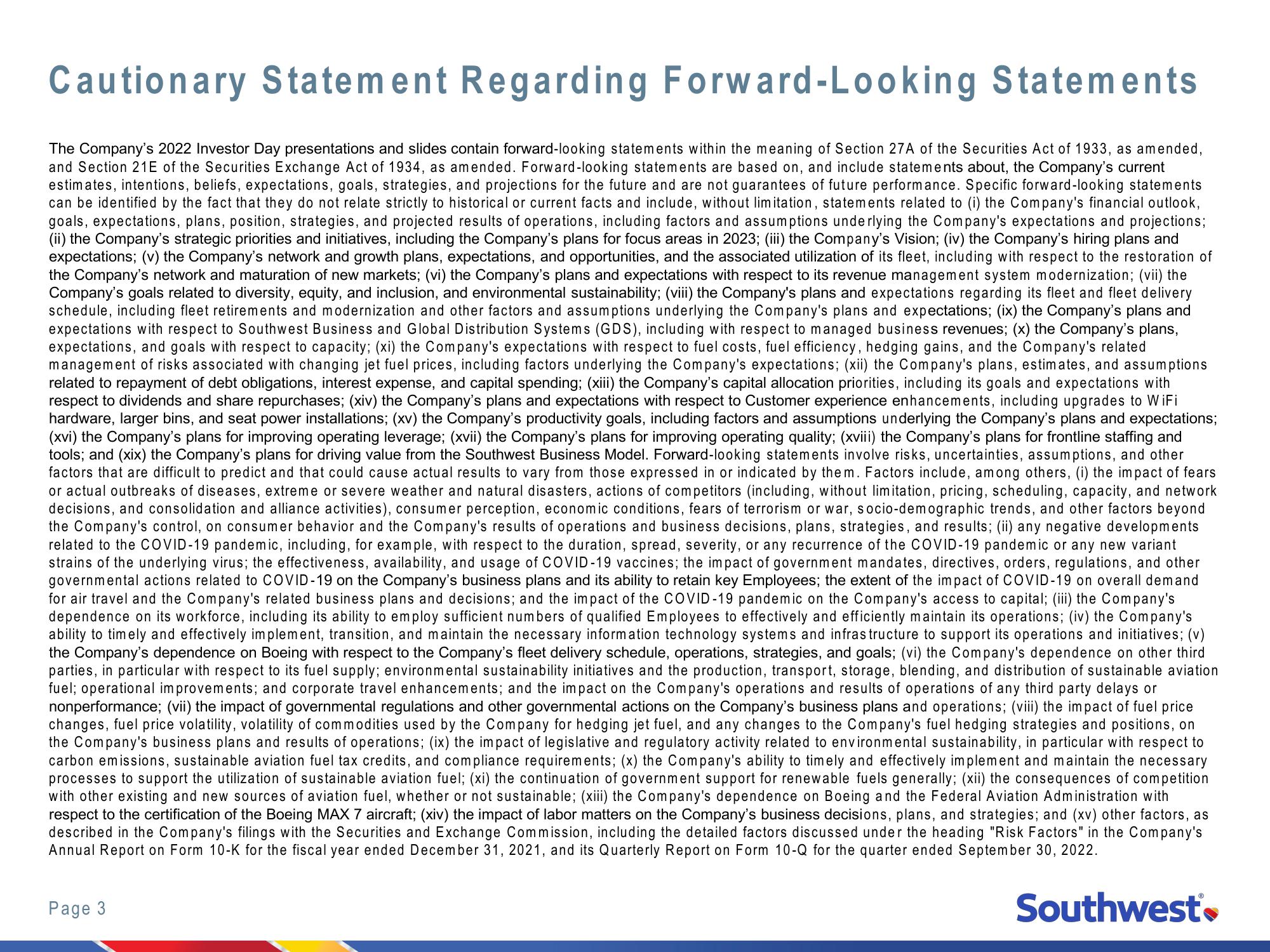2022 Investor Day New York Stock Exchange
Cautionary Statement Regarding Forward-Looking Statements
The Company's 2022 Investor Day presentations and slides contain forward-looking statements within the meaning of Section 27A of the Securities Act of 1933, as amended,
and Section 21E of the Securities Exchange Act of 1934, as amended. Forward-looking statements are based on, and include statements about, the Company's current
estimates, intentions, beliefs, expectations, goals, strategies, and projections for the future and are not guarantees of future performance. Specific forward-looking statements
can be identified by the fact that they do not relate strictly to historical or current facts and include, without limitation, statements related to (i) the Company's financial outlook,
goals, expectations, plans, position, strategies, and projected results of operations, including factors and assumptions underlying the Company's expectations and projections;
(ii) the Company's strategic priorities and initiatives, including the Company's plans for focus areas in 2023; (iii) the Company's Vision; (iv) the Company's hiring plans and
expectations; (v) the Company's network and growth plans, expectations, and opportunities, and the associated utilization of its fleet, including with respect to the restoration of
the Company's network and maturation of new markets; (vi) the Company's plans and expectations with respect to its revenue management system modernization; (vii) the
Company's goals related to diversity, equity, and inclusion, and environmental sustainability; (viii) the Company's plans and ex ns regarding its fleet and fleet delivery
schedule, including fleet retirements and modernization and other factors and assumptions underlying the Company's plans and expectations; (ix) the Company's plans and
expectations with respect to Southwest Business and Global Distribution Systems (GDS), including with respect to managed business revenues; (x) the Company's plans,
expectations, and goals with respect to capacity; (xi) the Company's expectations with respect to fuel costs, fuel efficiency, hedging gains, and the Company's related
management of risks associated with changing jet fuel prices, including factors underlying the Company's expectations; (xii) the Company's plans, estimates, and assumptions
related to repayment of debt obligations, interest expense, and capital spending; (xiii) the Company's capital allocation priorities, including its goals and expectations with
respect to dividends and share repurchases; (xiv) the Company's plans and expectations with respect to Customer experience enhancements, including upgrades to WiFi
hardware, larger bins, and seat power installations; (xv) the Company's productivity goals, including factors and assumptions underlying the Company's plans and expectations;
(xvi) the Company's plans for improving operating leverage; (xvii) the Company's plans for improving operating quality; (xviii) the Company's plans for frontline staffing and
tools; and (xix) the Company's plans for driving value from the Southwest Business Model. Forward-looking statements involve risks, uncertainties, assumptions, and other
factors that are difficult to predict and that could cause actual results to vary from those expressed in or indicated by them. Factors include, among others, (i) the impact of fears
or actual outbreaks of diseases, extreme or severe weather and natural disasters, actions of competitors (including, without limitation, pricing, scheduling, capacity, and network
decisions, and consolidation and alliance activities), consumer perception, economic conditions, fears of terrorism or war, socio-demographic trends, and other factors beyond
the Company's control, on consumer behavior and the Company's results of operations and business decisions, plans, strategies, and results; (ii) any negative developments
related to the COVID-19 pandemic, including, for example, with respect to the duration, spread, severity, or any recurrence of the COVID-19 pandemic or any new variant
strains of the underlying virus; the effectiveness, availability, and usage of COVID-19 vaccines; the impact of government mandates, directives, orders, regulations, and other
governmental actions related to COVID-19 on the Company's business plans and its ability to retain key Employees; the extent of the impact of COVID-19 on overall demand
for air travel and the Company's related business plans and decisions; and the impact of the COVID-19 pandemic on the Company's access to capital; (iii) the Company's
dependence on its workforce, including its ability to employ sufficient numbers of qualified Employees to effectively and efficiently maintain its operations; (iv) the Company's
ability to timely and effectively implement, transition, and maintain the necessary information technology systems and infrastructure to support its operations and initiatives; (v)
the Company's dependence on Boeing with respect to the Company's fleet delivery schedule, operations, strategies, and goals; (vi) the Company's dependence on other third
parties, in particular with respect to its fuel supply; environmental sustainability initiatives and the production, transport, storage, blending, and distribution of sustainable aviation
fuel; operational improvements; and corporate travel enhancements; and the impact on the Company's operations and results of operations of any third party delays or
nonperformance; (vii) the impact of governmental regulations and other governmental actions on the Company's business plans and operations; (viii) the impact of fuel price
changes, fuel price volatility, volatility of commodities used by the Company for hedging jet fuel, and any changes to the Company's fuel hedging strategies and positions, on
the Company's business plans and results of operations; (ix) the impact of legislative and regulatory activity related to environmental sustainability, in particular with respect to
carbon emissions, sustainable aviation fuel tax credits, and compliance requirements; (x) the Company's ability to timely and effectively implement and maintain the necessary
processes to support the utilization of sustainable aviation fuel; (xi) the continuation of government support for renewable fuels generally; (xii) the consequences of competition
with other existing and new sources of aviation fuel, whether or not sustainable; (xiii) the Company's dependence on Boeing and the Federal Aviation Administration with
respect to the certification of the Boeing MAX 7 aircraft; (xiv) the impact of labor matters on the Company's business decisions, plans, and strategies; and (xv) other factors, as
described in the Company's filings with the Securities and Exchange Commission, including the detailed factors discussed under the heading "Risk Factors" in the Company's
Annual Report on Form 10-K for the fiscal year ended December 31, 2021, and its Quarterly Report on Form 10-Q for the quarter ended September 30, 2022.
Southwest
Page 3View entire presentation